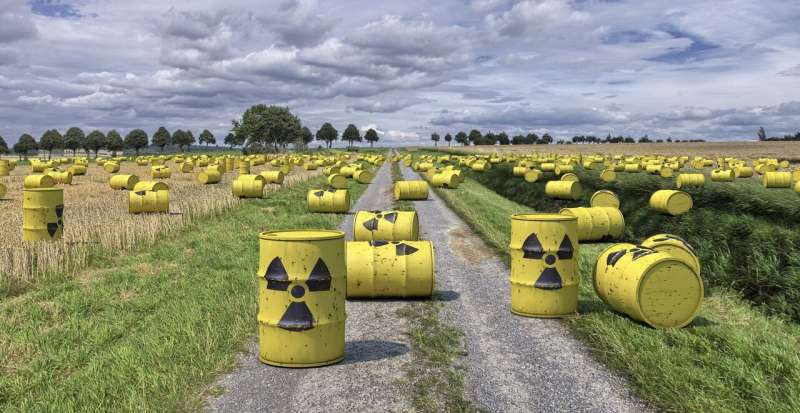Tribal vote nixes plans for radioactive waste storage underground near Lake Huron

An Ontario power company has announced it will no longer consider storing low- to intermediate-level radioactive waste within 1 mile of the Lake Huron shoreline, after a local Indian tribe's vote in opposition to the project.
But a similar plan to store underground highly radioactive spent nuclear fuel from Canada's nuclear power plants could still happen in the Great Lakes Basin.
Saugeen Ojibway Nation members on Friday voted to reject a proposed Deep Geologic Repository at the Bruce Nuclear Generating Station in Kincardine, Ontario. The result was 1,058 tribal members voting against the repository, 170 voting for it.
Ontario Power Generation committed in 2013 that it would not build the repository at the Bruce site without support of the tribe.
"OPG respects the decision of SON members," said OPG CEO and President Ken Hartwick in a statement. "We will now move forward to develop an alternate solution."
The repository was to store almost a half-mile underground low- to intermediate-level radioactive waste from OPG-owned nuclear generating stations at Bruce, Darlington and Pickering, Ontario. The waste is currently being stored aboveground, but a more permanent solution in the underground repository was sought.
The vote was "a historic milestone and momentous victory for our people," said Chief Lester Anoquot of the Chippewas of Saugeen Ojibway Nation in a statement.
"We worked for many years for our right to exercise jurisdiction in our territory and the free, prior and informed consent of our people to be recognized," he said.
"As Anishinaabe, we didn't ask for this waste to be created and stored in our territory, but it is here. We have a responsibility to our Mother Earth to protect both her and our lands and waters."
The repository plan garnered almost universal opposition from lawmakers, residents and environmentalists in Michigan and other Great Lakes states, because of its potential, however remote, to contaminate the Great Lakes, a regional economy of 107 million people with a gross domestic product of $6 trillion and the drinking water source for 40 million people on the U.S. and Canadian sides.
OPG officials said deep geologic repositories "are recognized around the world as a scientifically sound solution" for radioactive waste.
"Nuclear energy—as a non-emitting source of electricity—is a vital tool in fighting climate change," Hartwick said. "To enjoy the benefits of this low-carbon, low-cost and reliable source of energy with peace of mind, we must manage the waste responsibly. Permanent and safe disposal is the right thing to do for future generations."
Any new process on a different site for a low- to intermediate-level radioactive waste repository will include engagement with indigenous peoples and interested municipalities, OPG officials said.
But another proposed underground repository, this one for Canada's highly radioactive spent nuclear fuel, is still under consideration, potentially in the same area of Ontario, within the Great Lakes Basin.
The Canadian Nuclear Waste Management Organization (NWMO) late last year announced it has reduced its 22 potential host sites for that permanent underground storage site down to two, with one of them being in Bruce County, Ontario, near the same location as proposed for the low- to intermediate-level radioactive waste.
In January, the organization announced it had reached a combination of purchase and option agreements with landowners in South Bruce to allow technical site evaluations for a potential spent nuclear fuel repository location. The NWMO has committed about $23 million Canadian ($17.3 million U.S.) to secure access to the land in South Bruce.
"Going forward, technical site evaluations and social studies will continue in South Bruce, in southern Ontario, and Ignace, in northern Ontario," NWMO spokesman Bradley Hammond told the Free Press last month. "We expect to identify a single, preferred location for a deep geological repository for used nuclear fuel, to be located in an area with informed and willing hosts, by 2023."
©2020 Detroit Free Press
Distributed by Tribune Content Agency, LLC.
















